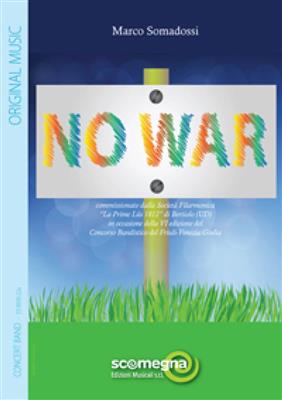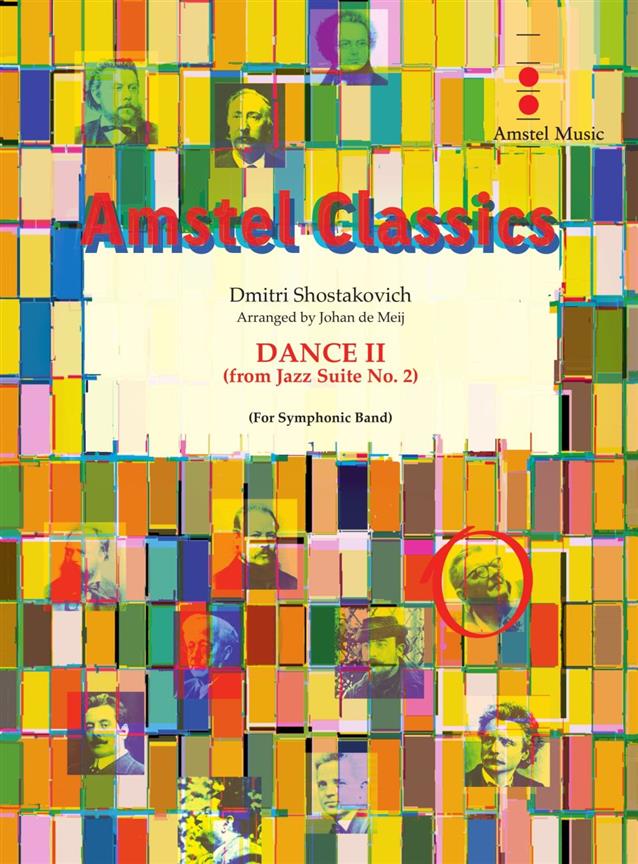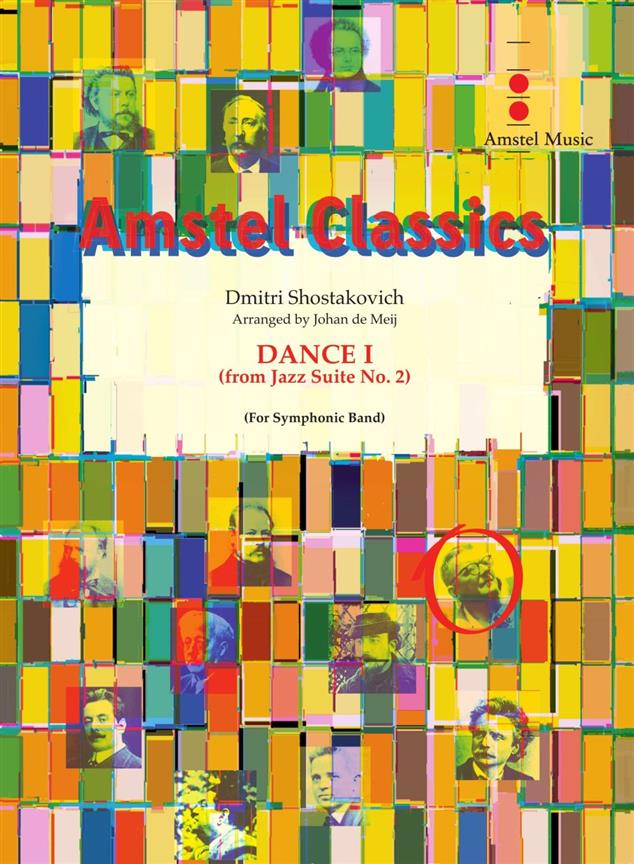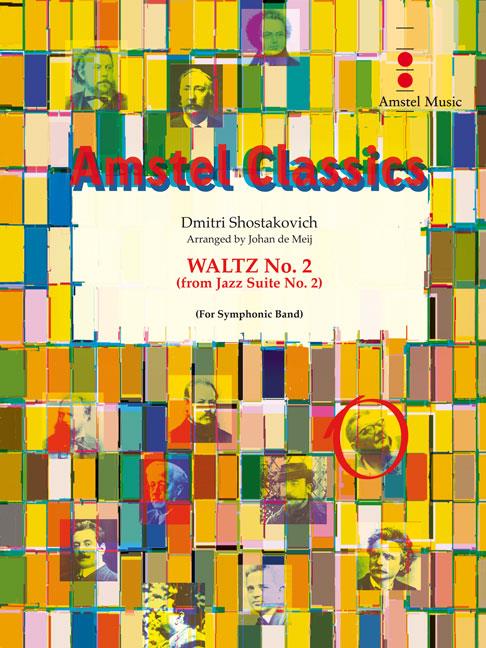Results
-
 £149.40
£149.40Norwegian Dance No. 1 - Alfred Evensen
Alfred Evensen (1883 - 1942) was born in Troms, but moved to Harstad 16 years old to start as a student at The Military School of Music. He was director and chief of the military band in 1918, and worked there for 12 years. In 1930 he was appointedto conductor of the military band in Bergen, and worked there until he was appointed to take over from Johannes Hanssen (Valdres march) as manager and conductor of the military band in Oslo in 1934.With this band he participated in a majorinternational military music collection in Paris in 1935 With a great success. In addition to his work in military music, he was a highly respected conductor of choir and composed, in additionto his compositions for bands, many songs for choir.He died in Oslo, after he was arrested because of his resistance against the German occupation. At his own request he was buried in Harstad, and there is also a statue of him.Norwegian Dance No. 1 and No. 2 dates from 1911 and 1912respectively. They are composed in the style of Grieg's Norwegian Dances, Op. 35, but, unlike Grieg, Evensen has used his own themes for the compositions.
Estimated dispatch 7-14 working days
-
 £105.80
£105.80No War - Marco Somadossi
The theme of this composition is immediately evident from the title, which almost requires no further explanation. It will never be possible to represent or reproduce the full implications of a tragedy such as war, all too often forgotten, concealed, exploited or written off as being an evil that is "necessary" for the development of civilisation. War changes the course of human history: man kills man, fathers bury their sons, children take up arms, and mankind is devastated by evil, choosing death over life. The atrocities, repeatedly perpetrated and evident to all observers, are an offence to human dignity. Yet they are tolerated and, at times, even re-interpreted as inevitable remedies for "obstacles" to the global economy, in order- it would seem- to build "a better world". And all this goes on despite the fact that the terrible scars left by past wars are still evident and should serve as a warning to ensure that such tragedies do not return to devastate our world. "No War" is thus a heart-felt protest against any form of culture that justifies war as a means of gaining wealth and power, satisfying the economic needs of the richest countries at the expense of the poorest nations. In so doing the one truly fundamental value is annihilated, that of human life.
Estimated dispatch 7-14 working days
-
 £102.99
£102.99Jazz Suite No. 2 - Waltz No. 2 - Dimitri Shostakovich
In 1938 Shostakovich composed his Second Jazz Suite at the request of the recently founded State Orchestra for Jazz conducted by Victor Knushevitsky.This suite was originally scored for a complete symphony orchestra to which four saxophones, an accordion and a guitar had been added. The Jazz Suite no. 1 in three movements, composed in 1934, had been written for a smaller ensemble. The title 'Jazz Suite' is rather misleading, as the composer definitely uses the style of light music. Back in 1928, the twenty-two-year-old Shostakovich had already composed some light music.A bet among friends to make an orchestration of the popular song 'Tea for Two' in less thenone hour time, caused him to compose 'Tahiti Trot'. Shostakovich easily won the bet as he completed the original and witty arrangement within only forty minutes!
Estimated dispatch 7-14 working days
-
 £94.00
£94.00Dance No. 2 (from Jazz Suite No.2) (Concert Band - Score and Parts) - Shostakovich, Dmitri - De Meij, Johan
In 1938 Shostakovich composed his Second Jazz Suite at the request of the recently founded State Orchestra for Jazz conducted by Victor Knushevitsky. This suite was originally scored for a complete symphony orchestra to which four saxophones, an accordion and a guitar had been added. The Jazz Suite no. 1 in three movements, composed in 1934, had been written for a smaller ensemble. The title 'Jazz Suite' is rather misleading, as the composer definitely uses the style of light music. Back in 1928, the twenty-two-year-old Shostakovich had already composed some light music. A bet among friends to make an orchestration of the popular song 'Tea for Two' in less then one hour time, caused him to compose 'Tahiti Trot'. Shostakovich easily won the bet as he completed the original and witty arrangement within only forty minutes!Duration: 3.45
Estimated dispatch 7-14 working days
-
 £98.00
£98.00Dance No.1 (from Jazz Suite No.2) (Concert Band - Score and Parts) - Shostakovich, Dmitri - De Meij, Johan
In 1938 Shostakovich composed his Second Jazz Suite at the request of the recently founded State Orchestra for Jazz conducted by Victor Knushevitsky. This suite was originally scored for a complete symphony orchestra to which four saxophones, an accordion and a guitar had been added. The Jazz Suite no. 1 in three movements, composed in 1934, had been written for a smaller ensemble. The title 'Jazz Suite' is rather misleading, as the composer definitely uses the style of light music. Back in 1928, the twenty-two-year-old Shostakovich had already composed some light music. A bet among friends to make an orchestration of the popular song 'Tea for Two' in less then one hour time, caused him to compose 'Tahiti Trot'. Shostakovich easily won the bet as he completed the original and witty arrangement within only forty minutes!Duration: 3.00
Estimated dispatch 7-14 working days
-
 £57.50
£57.50No Time to Die (from No Time To Die)
Delayed by the pandemic but scheduled for release in 2021, the much anticipated James Bond film No Time to Die features a darkly beautiful and moody theme song recorded by Billie Eilish. With hints of the signature Bond harmonicflavor and stylish setting, this already on its way to becoming a classic.
Estimated dispatch 7-14 working days
-
 £110.00
£110.00The Quest (Symphony No. 3, 'Don Quixote,' Mvt. I) - Robert W. Smith
At long last, Robert W. Smith gives us another major work based upon classic literature. Symphony No. 3 Don Quixote musically portrays the classic tale of the errant knight, his trusty yet bumbling squire and their adventures in the name of chivalry. The Quest, the first of four movements, is distinctly Spanish in flavor. Using a blend of classic and contemporary techniques, the composer weaves together a sonic tale of the gentleman of La Mancha who takes up his lance and sword to defend those that are helpless and destroy those that are evil. Captivating, musical and full of vivid imagery, Symphony No. 3 "Don Quixote" will be a performance that is memorable for performer and audience alike.
Estimated dispatch 7-14 working days
-
 £98.00
£98.00Waltz No.2 (from Jazz Suite No.2) (Concert Band - Score and Parts) - Shostakovich, Dmitri - De Meij, Johan
In 1938 Shostakovich composed his Second Jazz Suite at the request of the recently founded State Orchestra for Jazz conducted by Victor Knushevitsky. This suite was originally scored for a complete symphony orchestra to which four saxophones, an accordion and a guitar had been added. The Jazz Suite no. 1 in three movements, composed in 1934, had been written for a smaller ensemble. The title 'Jazz Suite' is rather misleading, as the composer definitely uses the style of light music.Duration: 3:45
Estimated dispatch 7-14 working days
-
 £99.00
£99.00The Quest (Symphony No. 3, 'Don Quixote,' Mvt. I)
At long last, Robert W. Smith gives us another major work based upon classic literature. Symphony No. 3 Don Quixote musically portrays the classic tale of the errant knight, his trusty yet bumbling squire and their adventures in the name of chivalry. The Quest, the first of four movements, is distinctly Spanish in flavor. Using a blend of classic and contemporary techniques, the composer weaves together a sonic tale of the gentleman of La Mancha who takes up his lance and sword to defend those that are helpless and destroy those that are evil. Captivating, musical and full of vivid imagery, Symphony No. 3 "Don Quixote" will be a performance that is memorable for performer and audience alike.
Estimated dispatch 7-14 working days
-
 £204.00
£204.00L'Arlesienne Suite No. 2 - Georges Bizet
The arrangement for wind orchestra of Georges Bizet's L'Arlsienne Suite No. 2 by Franco Cesarini came about after the composer had long sought a version of the work that would satisfy him.Franco Cesarini remains completely faithful to the original version by revealing and highlighting each section and all the facets of the wind orchestra.The premiere of L'Arlsienne Suite No. 2 was held in Lugano on 27 March 2022, during the Spring Concert of the Civica Filarmonica conducted by Franco Cesarini.
Estimated dispatch 7-14 working days
